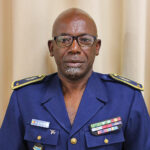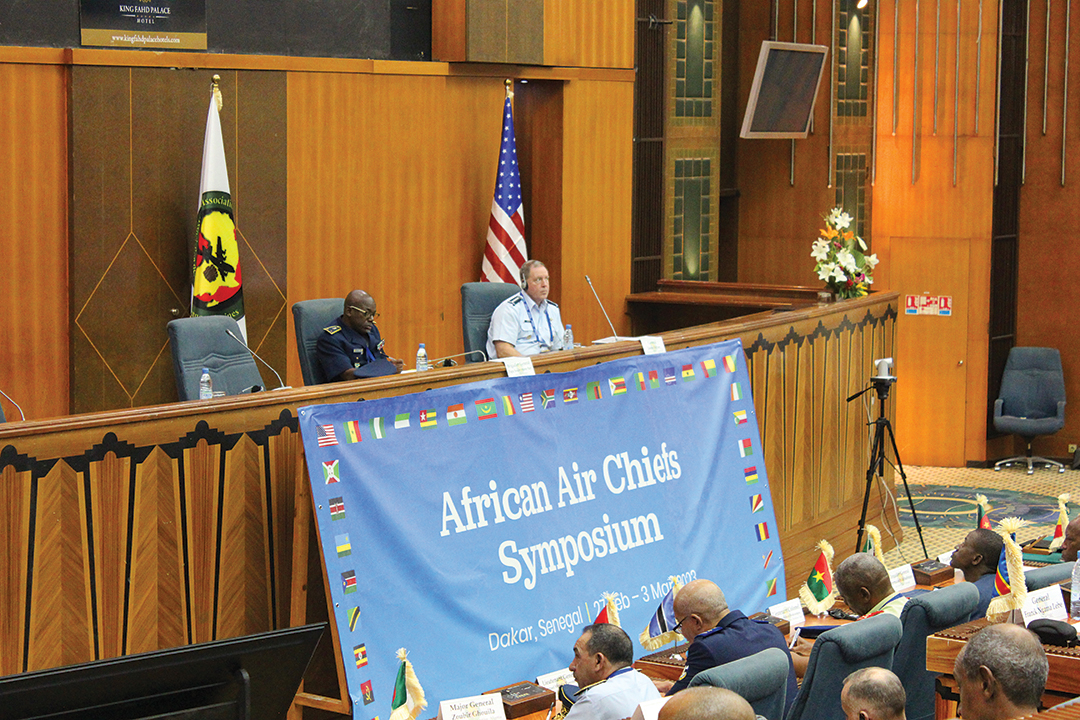 Brig. Gen. Papa Souleymane Sarr has been chief of staff of the Senegalese Air Force since November 2020. He entered the Air Force in 1985, attending Le Cours Spécial de l’École de l’Air in France, where he earned his pilot rating and a degree in engineering. He was awarded the United Nations Medal and the French Aeronautical Medal of Honor for his service with the U.N. He has commanded at all levels of the Air Force, including head of the Operational Wing, Air Force Intelligence, Air Force Instruction and commandant of the Air Force Academy. He served as co-host of the 2023 African Air Chiefs Symposium in Dakar, Senegal, from February 28 through March 3. He spoke at the opening ceremony, and his remarks have been translated from the original French and edited for space and clarity.
Brig. Gen. Papa Souleymane Sarr has been chief of staff of the Senegalese Air Force since November 2020. He entered the Air Force in 1985, attending Le Cours Spécial de l’École de l’Air in France, where he earned his pilot rating and a degree in engineering. He was awarded the United Nations Medal and the French Aeronautical Medal of Honor for his service with the U.N. He has commanded at all levels of the Air Force, including head of the Operational Wing, Air Force Intelligence, Air Force Instruction and commandant of the Air Force Academy. He served as co-host of the 2023 African Air Chiefs Symposium in Dakar, Senegal, from February 28 through March 3. He spoke at the opening ceremony, and his remarks have been translated from the original French and edited for space and clarity.
For the past 15 years, several regions of the African continent have seen the movements of terrorists, including Jama’at Nasr al-Islam wal Muslimin, the Islamic State in the Greater Sahara, Boko Haram in the Lake Chad region, al-Shabaab in the Horn of Africa and the Islamic State group in the Maghreb.
These groups have caused several thousand deaths and several million people to be displaced, thus leading to unprecedented humanitarian devastation. One has to acknowledge that these small groups are attempting to control vast territories located between several countries.
Furthermore, the existence of vast areas that are difficult to control, combined with porous borders and the surge of all kinds of trafficking, requires that we adopt a synergistic and collective approach.
In the face of this particularly worrisome situation, it is urgent that we, as defense officials, take advantage of the opportunity offered by this symposium to share our experiences and exchange various paths toward solutions in order to contain these threats that impact the security of our nations and represent an obstacle to development.
At the end of this symposium, we will need to derive some shared solution paths that our air forces may consider in order to strengthen their roles in the inclusion of transnational threats with increasingly sophisticated modes of action.
Thus, our air forces have the duty to strengthen their operational capabilities at all levels for the purpose of better and more efficiently addressing security challenges by means of an attitude of permanent vigilance and improved cooperation among ourselves.
The threat transcends our borders, our beliefs and our ideologies. This is why the armed forces of the African countries, and above all their air forces, are being increasingly called to action.
Before reaching these objectives, it may be necessary to implement various acquisition projects for tactical multimodal carriers to be used in a large number of air-land missions, thus enabling us to have appropriate aerial coverage of our territories.
The empowerment and modernization of our African air forces, although crucial, are only one step toward eliminating these transnational threats. It is above all essential to work toward the development of a more collaborative approach to address the common security challenges by sharing our resources.
Meetings such as this one are an excellent opportunity for, on one hand, sharing our difficulties and perspectives, and, on the other, strengthening our cooperation toward the suppression of our common enemies, who know no physical borders.


Comments are closed.